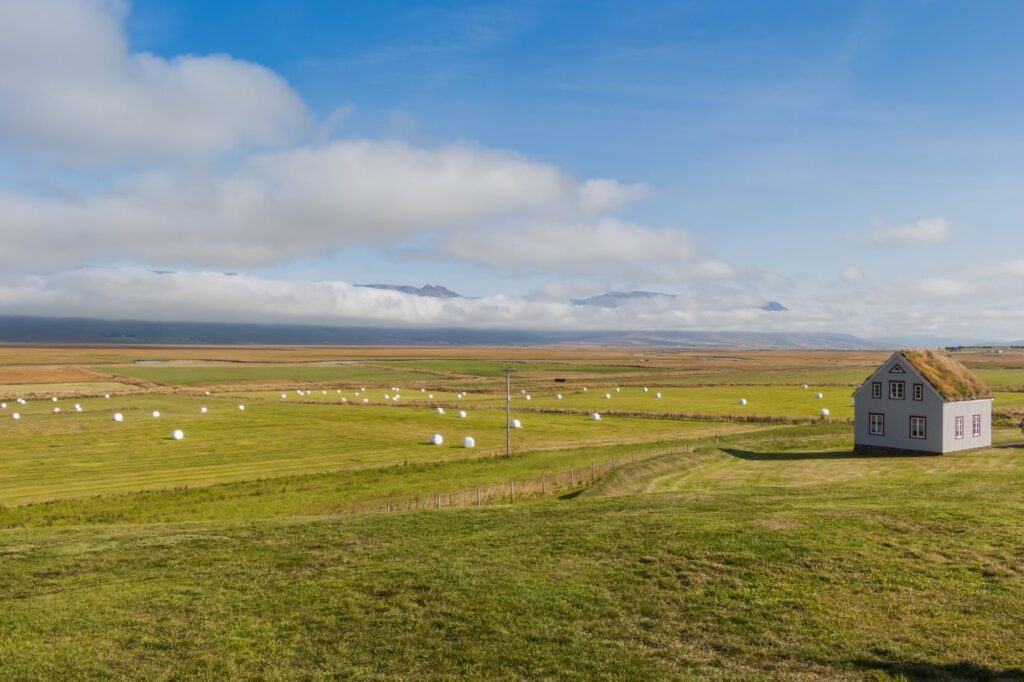
Agriculture is Colorado’s second-largest industry (second only to the mining industry) and its 38,000+ farms generate over $40 billion annually for the economy. In short, farming is the lifeblood of the state.
But farming faces many threats. Rising costs and climate change are two of the biggest challenges, and it’s becoming harder for Colorado’s farmers to achieve profitability.
Off-grid solar won’t solve all the problems farmers face, but it can greatly benefit them and even be profitable. In this article, we uncover the advantages of off-grid solar and how it can save farmers a significant amount of cash.
In a Nutshell
- Off-grid farming solar removes reliance on the grid and enables farmers to have a completely independent power supply.
- The benefits of off-grid solar include a significant reduction in energy costs, increased energy resilience, and the ability to optimize and improve farming practices.
- Off-grid solar systems can be used to run irrigation pumps, electric fencing, refrigeration units, dwellings and outbuildings, and more.
- A farm’s income can be boosted by using off-grid solar and operational costs can be significantly reduced.
Why Choose Off-Grid Solar?

Compared with a homeowner’s energy needs, farms have a unique set of requirements.
A farm needs to keep a great many things running – from equipment and vehicles to outbuildings, operations units, electrical fencing, irrigation systems, and much more.
This presents two key issues: a massive monthly energy bill and the inability to supply reliable power to areas of the farm that cannot be connected to the grid.
On-grid solar will easily address a large energy bill, but it can only power what is already connected to the grid.
In contrast, off-grid solar not only saves you money but also enables the possibility of powering what the grid cannot. As a result, your farm is presented with more opportunities to save money or increase revenue that previously wasn’t possible.
The Benefits of Off-Grid Solar
There’s no point investing in something if it carries no benefit. Thankfully, off-grid farm solar energy has a tonne of benefits to enjoy.
Energy Cost Savings

The first – and most obvious – benefit of off-grid farming is the energy cost savings you make. Sure, a solar installation is expensive, but given the current plethora of government incentives and tax credits, you can easily see a 100% ROI within a couple of years.
After that, you can enjoy a reduction in power bills of up to 96%. And given the operational costs of a farm and the resulting power bills, this energy cost saving is a significant amount.
Independence From the Grid
Right now, solar owners in Colorado enjoy a favorable energy exchange arrangement with utility companies called net metering. For every kWh worth of energy you send to the grid, you earn 1 kWh worth of grid energy to use when your solar system is not producing electricity.
This leads many to question why they would bother to install an off-grid system in the first place.
Well, besides the other benefits listed here, you never know what the future holds. It’s no secret that utility companies across the US are lobbying governments to change net metering policies where they exist into something that benefits them but is a lot less advantageous for you.
The point is, while on-grid systems are great now, you never know what may change in a year or two.
An off-grid farm means you get to keep, use, and enjoy ALL the electricity your solar system produces, regardless of what the grid decides to do with its net metering policies.
Increased Resilience

Increased resilience is an extension of the point above. The grid – particularly in remote areas – can be unreliable.
Brownouts and blackouts are becoming increasingly common, and while the average homeowner can make do with a gas stove and a few candles for a number of hours, the same can’t be said for businesses.
Imagine if you had to cease your farming operations for several days because of a grid blackout. What if it occurred during a critical farming period, such as harvesting? How much money would you lose?
Off-grid systems don’t have this problem because they don’t rely on any of the grid infrastructure to work. And since Colorado is famed for its 300+ days of sunshine per year, solar energy is always going to be in plentiful supply.
Sustainability
There’s no doubt that solar energy plays a significant role in sustainability and environmental stewardship. It is everyone’s responsibility to move toward a green future and transitioning your farm to solar is a big step forward.
Farming relies heavily on the surrounding environment and the impact of climate change could be huge. Therefore, making changes now will help preserve your business for you and your future generations.
Power Remote Areas

Farms are usually large and sprawling. If you have a need for electricity in one of the more remote areas, you have two choices: to either run cabling from your meter to the area in question or run generators to get the required power.
Both options are expensive and inconvenient, particularly generators since you have to factor in the cost of fuel.
With off-grid solar, you have a lot more flexibility. Solar panels can be installed in most areas, giving you the ability to power far-flung places around your farm.
Less Maintenance and Disturbance
As mentioned, diesel or petrol-powered generators are generally the preferred way to power areas of a farm that can’t be connected to the grid.
But generators aren’t a great solution. They need regular oil changes, battery maintenance, cleaning, professional servicing, load testing, and more. Plus you’re going to be back and forth ALL the time since it will regularly need topping up with fuel.
Like a vehicle, generators generate a tonne of noise and pollution. This isn’t so much of a concern if you’re powering something like an irrigation pump, but if you want to run an off-grid cabin or guesthouse, no one will want to stay there if there’s a dirty generator thundering nearby.
In contrast, an off-grid solar installation requires hardly any maintenance and makes absolutely zero noise or pollution.
What Can You Use Off-Grid Solar Energy for?
The possibilities of off-grid solar energy are endless, so here are some of the most common applications for the technology.
Irrigation Systems

Drought is a key concern for Colorado’s farms with water already in tight supply. Therefore, it has never been more urgent to implement efficient watering systems.
Solar-powered water pumps for irrigation systems can greatly reduce the cost of watering crops or livestock since they remove the need to use generators or run expensive cabling to your electricity meter.
A common way to maximize this setup is to have the pumps deliver water to a storage tank during daylight hours (when the solar panels are generating energy), and then have a steady drip irrigation system to deliver the water to wherever it needs to go.
Solar water pumps also make it easier to get consistent water coverage as you are more able to reach the remoter areas of your farm.
Additionally, if you have watering areas for livestock, having them concentrated in one area can lead to soil erosion and reduced water quality. Solar water pumps allow you to increase the number of watering areas, resulting in healthier soil and livestock.
Water Purification
If your farm requires the use of treated water, you can harness solar power for this purpose. The solar installation can run pumps, filters, and UV sterilization units, further reducing your operational costs.
Lighting and Electric Fencing
You can use an off-grid solar system to illuminate areas that are not connected to the grid, like barns, sheds, and carports. You can even light up fields for added security or to make working during dark hours easier.
If you use electric fencing to keep livestock contained, the off-grid system will allow you to expand your electrified enclosures to more remote areas of the farm.
Remote Dwellings

Diversifying revenue streams has become increasingly common for farmers across the US. One lucrative way to gain additional income is by renting out dwellings on your farm property.
Cabins, treehouses, tiny homes, etc. are all highly sought after by folks looking to escape to the countryside and take in the fresh air.
If you have a beautiful spot to place a dwelling, or you have an off-grid hut that you want to rent out, you can power it with solar instead of connecting it to the grid or relying on generators.
You’ll get the revenue from the rentals and you won’t have to pay anything extra to power it!
Electric Vehicles and Machinery

With an off-grid solar installation, purchasing electric-powered equipment suddenly becomes an option. You can deliver power to your carports and equipment storage sheds, and install charging points in the areas you keep your vehicles.
Not only do you benefit from free power to charge your equipment, but you are also reducing your reliance on fossil fuels, giving the added benefit of increased sustainability and reduced pollution.
Refrigeration and Cold Storage
If your farm’s production operations require the use of cold storage, you know too well how important it is to have a constant power supply to your refrigeration units.
A power outage during the summer months can be devastating for cold-stored perishable goods and you can’t rely on the grid not to fail.
Off-grid solar power removes the concern of unreliable power and gives you a consistent and plentiful supply, no matter the season. And through the use of solar storage batteries, you will always have the backup power required for your refrigeration when the solar panels aren’t producing energy.
Agricultural Monitoring Systems
To optimize farming practices, it’s necessary to perform monitoring for things such as temperature, soil moisture levels, humidity, and other parameters.
Doing this allows you to adjust your crop management, pest control measures, irrigation systems, and more to help increase crop health and yields.
Monitoring systems require electricity to run, so it’s often impossible to perform analysis on larger farm areas.
With an off-grid solar system, however, you have the freedom to perform ongoing monitoring in areas that were previously inaccessible.
Crop Drying

As technology advances, it is now possible to install solar-powered thermal collectors. These generate heat that can be used to dry out agricultural produce.
Because the solar system produces a constant stream of energy, you get a more efficient drying process, which reduces spoilage and improves the overall quality of the produce.
How Off-Grid Solar Boosts Your Farm’s Income

It’s getting harder and harder to maintain a farm’s profitability. The cost of everything is rising, from operational costs to the price of feed, fuel, agricultural chemicals, labor, and more.
It’s not going to get any cheaper, either. With energy bills projected to skyrocket over the coming years and farm income declining, it has never been more urgent to find ways to reduce running costs and increase farm revenue.
Off-grid solar energy can address many of these financial problems. As we’ve outlined in the benefits above, this energy source can help you optimize your farming practices and significantly bring down costs.
Farms differ greatly from one to the next, so each one will benefit in a different way, but here’s a quick overview of how off-grid solar energy increases a farm’s profitability:
- Around 15% of a farm’s running costs are spent on fuel and electricity, with additional energy costs incurred through the purchase of fertilizer and pesticides. Off-grid solar can reduce these costs by up to 96%.
- By using off-grid solar to perform monitoring, dry crops, and run more effective irrigation systems, you can achieve better, healthier, and more profitable produce yields.
- Farmers can rent out solar-powered off-grid dwellings and increase income without increasing energy costs.
- A reliable and consistent power supply that doesn’t suffer from blackouts helps protect sensitive produce (such as refrigerated items) and reduces spoilage.
- Off-grid solar enables the expansion of farming to other, more remote areas.
- Adopting the use of electric-powered machinery and vehicles significantly reduces fuel and gas expenses.
- In comparison to generators, off-grid solar incurs next to no maintenance and repair costs.
Talk to 8760 Solar
No two solar installations are alike. Each farm or agricultural business has a unique set of requirements that requires a bespoke solar system to meet those needs.
At 8760 Solar, we’re well-versed in the challenges farmers face and how solar can address them. Through the use of our expertise and technology, we run a thorough analysis of your farm to determine the best kind of solar setup.
Whether on-grid or off-grid, we’ll design a solar energy system that will provide you with the most amount of benefit. Plus, we’ll help you successfully navigate and take advantage of all the current government incentives that are out there.
Text “READY” to 719 470-0254 or contact us via email: sales@8760solar.com and we’ll get back to you right away. We’re excited to show you the potential of solar energy and how it can help increase profitability for your farming business.
Frequently Asked Questions
Can Off-Grid Solar Power Multiple Buildings and Systems?
Off-grid solar power can certainly power multiple buildings and uses as long as the setup is large enough to accommodate the energy requirements.
Talk to your solar developer about your energy requirements and they will help you design a system that meets those needs.
Can Off-Grid Solar Be Used for Large-Scale Farming?
Yes, off-grid solar can and is used for large-scale farming. Though less commonly used than on-grid solar systems, off-grid solar is perfectly adaptable and scalable to suit industrial-sized farms.
Why Choose Off-Grid Solar Energy for Farms?
Off-grid solar removes a farm’s reliance on the grid, significantly reduces energy bills, and allows more remote parts of the farm to receive power. This allows the optimization of farming practices and systems, which can increase a farm’s profitability.
Can I Have Both an On-Grid and Off-Grid Solar Installation?
Yes! It is entirely possible to have a hybrid solar system installed. This provides you with battery storage to run off-grid systems but also allows you to draw power from the grid when needed.
Is Off-Grid Solar More Expensive?
Off-grid solar is generally more expensive than on-grid systems because it requires the use of batteries. Depending on the size of the solar system, a large number of batteries could be required, thus increasing costs further.
What Size Off-Grid Solar System Do I Need?
There is no “one-size-fits-all” approach to solar energy and the required size an off-grid solar system is entirely dependent on your needs and what you want to power. To gain a full understanding of this, ask your solar developer to run an analysis of your farm.
Do I Need a Battery for Off-Grid Solar?
Batteries are an essential component of off-grid solar. Since solar panels only produce energy during daylight hours, an off-grid system needs somewhere to store the excess energy for use during times when the panels are ineffective.
Essentially, battery storage gives you access to solar energy 24/7 and allows you to keep things running no matter the time of day or night.
